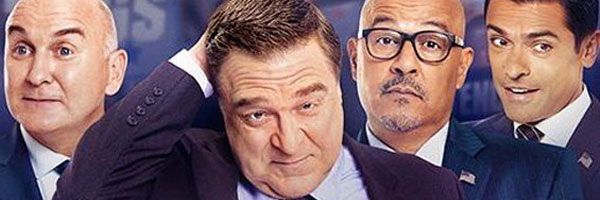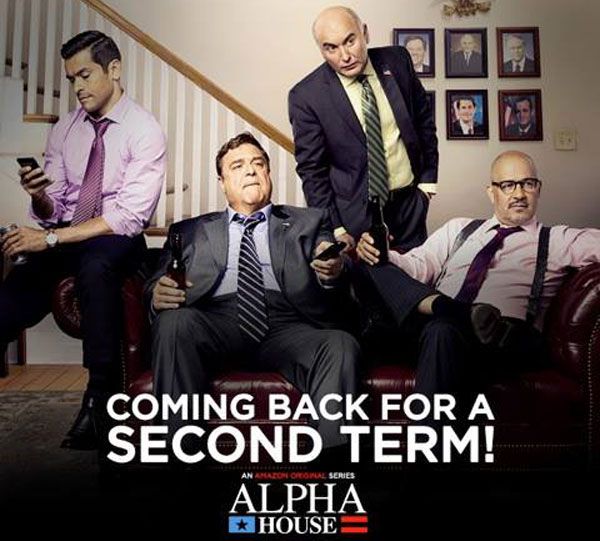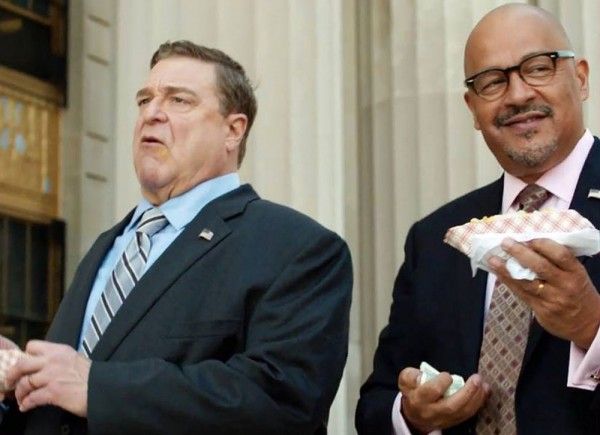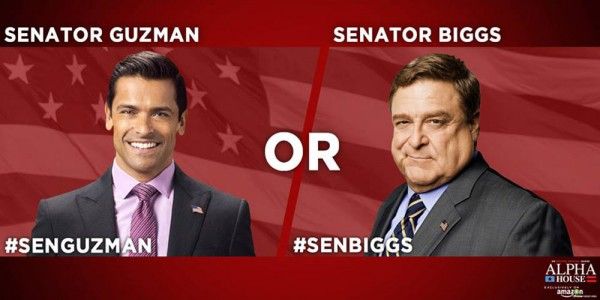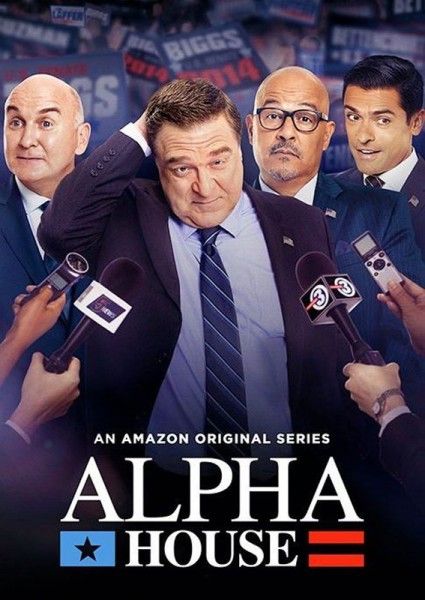From show creator/executive producer Garry Trudeau, the Amazon original series Alpha House is a hilarious comedy about four misfit senators – Gil John Biggs (John Goodman), Robert Bettencourt (Clark Johnson), Louis Laffer Jr. (Matt Malloy) and Andy Guzman (Mark Consuelos) – who rent a house together in Washington, D.C. and deal with all of the outrageousness that comes with a life in politics. Having watched Season 1, I can vouch for the fact that the writing is smart, the acting is great, and the stories are sometimes all-too-real, and Season 2 is sure to be that much stronger.
During this exclusive interview with Collider, Pulitzer Prize-winner Garry Trudeau talked about why a TV show and why Amazon, at this point in his career, what John Goodman brings to the show, why he’s turned down so many offers over the years, his previous TV experience, why he’s maintained such a low personal profile, what his writing process is like, and why the actors pretty much stick to the script for Alpha House. Check out what he had to say after the jump.
Collider: You’ve had four decades of experience with character humor and political satire, having created, written and animated the “Doonesbury” strip. Why a TV show and why Amazon, at this point in your career?
GARRY TRUDEAU: I would like to say that I was as aware of what was happening in streaming TV as everyone else was, but I wasn’t. I was really behind the curve. My partner, John Alter, had taken this script that I’d written four years earlier and shown it to Amazon, and they were drawn to it, immediately. I had to be talked into it because my idea of streaming TV, at that point, was YouTube. It didn’t feel like big-time TV to me. It felt like minuscule budgets and C-level actors. I thought I’d sooner just stay with my day job. But they made it very clear, from the very beginning, that they were aiming for HBO-quality shows and that they would give us the resources to do that. And they’ve been good to their word. They’ve given us what we need to do a show, at that level. I think people were a little surprised to see a show that’s as well made as this was, come out of streaming TV, right out of the gate. The team that I work with is just phenomenal. They work fast and they have very high standards for themselves, so the show has a good look and feel. In the second season, we just feel like we hit our stride. We were tested. We had a lot of mishaps, our first week.
What happened?
TRUDEAU: You get a little cocky. Things are going just a little too well, and then there are things totally out of your control, like an actor’s health or the rain. And we don’t really have much room for error. We have five-day shoots. We’ve gotta get it done, one way or the other.
What does John Goodman bring to the show?
TRUDEAU: John Goodman is like a national treasure, and a very unusual one. In this day and age, it seems like even the most popular actors and movie stars have their detractors. John doesn’t. No one hates on him. How could you? Why would you? He’s justly beloved, and he is in our company, as well. He’s so generous. Young actors are just in awe of him. He’s very approachable. He’ll stick around for the coverage and help them. He’s conducting a master class. It’s made such a difference, from the very beginning. He was the first of our actors to sign. He thought long and hard about it, for two days, and said, “Sure,” knowing that it was an ensemble. He’d just come off of two big movies. He seems to take a great deal of pleasure with these pros that we’ve surrounded him with, to play his three buddies. And the young kids are just in heaven. They can’t believe that they’re working with him, every day.
Have you had a lot of offers for film and TV, over the years?
TRUDEAU: I have had a fair number, but for the most part, I really like being a cartoonist. The first offer that I took was many years ago. HBO didn’t have series, and they were thinking that maybe it was a space that they should get into. Their head of original programming was a woman named Bridget Potter. She called me up and said, “We’re thinking of running a character for president. Would that be something interesting?” I said, “I would set the bar impossibly high, as far as my demands go.” I really didn’t think I could do it and also do my regular work, so I said, “If you can get Robert Altman to do it, I’ll do it.” They called back a week later and said, “You’re on!” This was in November, and we were going to track the election in real time. We had to have something on the air in January, and we had no story, no script, and no characters. We just scrambled. We hired a bunch of actors before we even had roles for them to play, and I just cobbled together the script, as fast as I could. We went up to the New Hampshire primary, shot during it and sent the episode in, and HBO had our print two hours before the air time. It never got much better than that. So, I got spoiled. It was a guerilla TV that no one does anymore, and they gave us enough money to do it right. I think most networks would have been too risk adverse to say, “Go do it,” and hope for the best. So, that was an offer I couldn’t refuse. I look back on it and, obviously, I had a lot more energy than I do now. I kept up the strip full-time, wrote the whole show, and had three small kids. I look back on that and think, “Wow, how did all of those pieces fit together?” I didn’t feel I could do justice with [Alpha House] and still do my strip, so I stopped, except for Sunday. It’s still difficult because I haven’t quite figured out the writing formula yet, and I end up doing most of the writing. That’s not ideal, if you’re also a producer on the show.
Is there anything that you regret passing on, or are you happy with the decisions you made, over the years?
TRUDEAU: It’s funny, I guess because I was doing something I really loved, I could be choosey, in that way. It wasn’t something where my family was depending on me to take the job to support them. For instance, I got a call from Oliver Stone and he said, “I’ve got this script about Manuel Noriega, the president of Panama, and I’d like you to take a pass at it.” He offered me what, for me, was a lot of money. Of course, I’m a great admirer of Stone, so I said, “All right, sure. I’ll take a look at it.” So, he sent it to me and I read it, and I re-read it. I called him back and said, “I can’t take your money. This script is really good. I’m not gonna mess with it just because I’m paid to. I have to feel like I really can contribute something, and your writer is terrific. This is a great script.” He never got to make it, and I could see how it wasn’t commercial. I’ve had the luxury of being able to pass on things, just because I was busy anyway. It wasn’t driven by a need to make a living at it.
You’ve always maintained a low personal profile. Was there a specific reason for that?
TRUDEAU: Yeah, there was, and I didn’t realize how beneficial it would be, at least for me. When I was first starting the strip, it was very controversial. It was forever being thrown out of papers, and episodes of the strip were being deleted. So, each time that happened, the local newspaper that carried it would call me up and ask me for comment. Sometimes it would become a national story, and then they’d want more comments. And I became so distracted by defending myself and my work that it was interfering with my ability to just get it done. So, I told my employers that, thereafter, I was just going to pass on any other interview opportunities because I thought I could do a better job for them, if I wasn’t constantly anticipating that criticism, and could figure out how to play a scene in context. The newspapers had a very reasonable demand on my time. They were paying me for this feature, but there were hundreds of them. I thought, “I’m just gonna spare myself that aggravation.” But the unintended consequence was that it gave the strip and me, personally, perhaps more of a mystique. I became a bit of a mystery to people. The benefit, of course, was that it allowed me to have a private life.
And then, I married a public person who couldn’t take the same attitude. She worked for a network, so she didn’t have that option. But, I figured that was enough for one family. We didn’t need both of us out there. Also, a unique feature of syndicated cartooning is that comic strips appear in people’s newspapers, whether they opt to pay for it or not. So, if I’m on The Tonight Show, there’s no relationship between that and people actually reading the strip. I wouldn’t be driving people to their newspaper, just because they were interested in or entertained by something I said on TV. So, it really didn’t have much benefit to me, the way it would, if I were in a different business. In fact, when I worked in the theater in the early ‘80s, I had a Broadway musical, so I made the rounds, otherwise people don’t know that you’ve done it. I had one play, called Rap Master Ronnie, that had different productions around the country, and I would just parachute into whatever town and do the interviews because that’s what you do to support a project. There are a lot of people depending on that. But for the strip, it wasn’t necessary. I was in a privileged position to avoid the distraction on that.
Then, why decide to go on The Colbert Report?
TRUDEAU: I did The Colbert Report because I was promoting [Alpha House]. And I’m talking to you because I care about the show and I want people to find out about it. It’s a new platform. It’s not just turning on your TV and being one of many options. You’ve gotta go look for it. I should be home writing, right now.
What is your writing process like? Do you have a set way of doing things?
TRUDEAU: Most writers seem to prefer the morning, or they feel at their best in the morning. Ideas are popping into your head while you’re in the shower. And that’s true for me, as well. I’m at my best, as a writer, in the morning. But with this show, I’m also the executive producer, so I have a lot of other responsibilities. I wish I could compartmentalize it and say, “These hours are for writing, and these are for this,” but that’s not the way TV is made. Ideally, I’d have them all written before we started shooting, but I didn’t. I had three written. So, I was a little schizophrenic, running to the stage, and then running back to my computer. And on location, it’s a nightmare. I sit out on a curb with my laptop, and then run over to video village and watch a scene, and then run back to my laptop. But, I’m not complaining. It’s a wonderful team and I’m happy to be a part of it. I’m having a good time.
Because of the very specific kind of show that Alpha House is, do you prefer that the actors stick to the script?
TRUDEAU: It is the opposite of working with some directors who take great liberties. Here, I actually have the control and everyone stays on book, pretty much. We’re very plot-driven and we’ve gotta hit all the right notes, or it doesn’t make sense. And it’s very specific character humor. There are no jokes. In a way, I think that’s liberating for the actors. They don’t have to sell it in a jokey way. They just behave, hopefully, as complete characters. The first season is a journey that you take with the actors, and you learn from their choices and discover who the characters are. I have enormous respect for what they do, and have benefited tremendously from it, particularly with the secondary characters. There’s not much going on, but then when you see the actors up on their feet, you know how to move that person forward.
Alpha House is now available on Amazon Prime.

